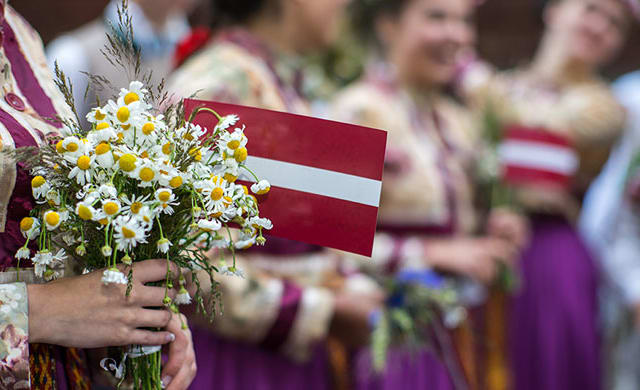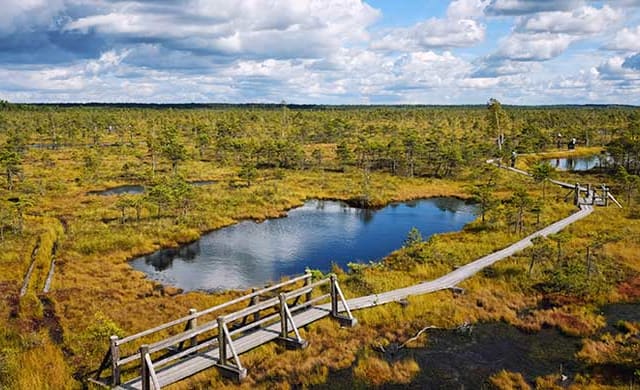Authentic Escape in Latvia
4.3/594 reviews
Latvia, the Baltic's undiscovered gem.
Explore its mystical forests and golden beaches.
Must-see locations
Latvia, an unforgettable adventure between nature and culture.
Traveling in Latvia, whether by rental car for a self-tour or on an accompanied tour, also means enjoying some of the most beautiful beaches in Northern Europe, with 500 km of coastline along the Baltic Sea and several golden sandy gems bordered by Scots pines like Liepaja, Ventspils, or the charming seaside resort of Jurmala.
Going to Latvia, as a couple or with friends, is about discovering a very green flat country covered by forests over more than half of the territory, featuring four large Natura 2000-labeled national parks and inhabited by brown bears, white and black storks, and gray wolves.
Visiting Latvia means enriching yourself with the millennial culture and tumultuous history of a country annexed in turn by Sweden, Poland, the Russian Empire, the German Empire, and finally the USSR from 1940 to 1991, the year of independence. In full economic renewal for about ten years, the Latvian State has been a member of the European Union since 2004 and of the eurozone since 2014.
A Baltic Gem to Explore Without Moderation
A tailor-made trip to Latvia will let you discover the beating heart of the Baltic States. Well surrounded by Estonia to the north and Lithuania to the south, you first go there to visit and enjoy the nightlife of Riga, the country's capital, whose historic center is classified as a UNESCO World Heritage site.

The Must-See Places in Latvia
About fifty kilometers northeast of Riga, in the Vidzeme region, Sigulda charms its visitors with the beauty of its landscapes of hills, rivers, and forests. The city is also notable for its medieval castle, the Gutmanis cave, and its Gothic houses.
Stretching about forty kilometers along the Gulf of Riga, Jūrmala is the star of the Latvian Riviera. It consists of numerous seaside resorts with white sand beaches, luxury hotels, and spas.
Riga, the capital of Latvia, is the largest and most populous of the three Baltic States. It attracts visitors with its historic center listed as a UNESCO World Heritage site, known for its concentration of Art Nouveau buildings. The city also offers festive and tourist sites such as the Dome Cathedral or the large central market.

Exploring Latvia off the Beaten Path
The most dizzying waterfalls in Europe await you in the west of the country, in the Kuldīga region. These waterfalls tumble down nearly 300 meters and are a popular fishing spot. It's a true natural monument.
The Rundale Palace, nicknamed the Latvian Versailles, is a marvel of Baroque architecture located in the center of the country. Built in the 18th century, Rundale Castle offers 140 richly decorated rooms and a magnificent French-style garden.
Hiking trails abound on the Latvian coast. Among the beautiful walks to take in the Gulf of Riga, climbing the white dune, the "Balta Kapa," offers a magnificent panorama of the Baltic Sea.
A Polyglot and Open-Minded People
One of the characteristics of small states is the multilingualism of their inhabitants, and Latvia is no exception. Due to its history, the Latvian people have had to speak German and Russian. English is a mandatory language in school, and it is universal for business and politics. With the accession to the European Union, although Latvian has become one of the official languages of the EU, French, Italian, and German are increasingly gaining ground. In Riga, you can easily communicate in several languages. If you go to the west of the country (regions of Kurzeme, Zemgale, and Vidzeme), Latvian will be necessary. If you head east, you can also express yourself in Russian in the Latgale region.
A Living Museum of Pre-Christian and Medieval Europe
Evangelized late and superficially, the Latvians, often under the domination of a different ethnicity, have placed great importance on their folklore and pagan mythology. Even today, these elements occupy a major place in Latvian culture and daily life. Unlike a French person, a Latvian might sing you a popular or traditional song. Pagan traditions are present during celebrations like Christmas, Easter, St. John's Day, or All Souls' Day. For example, dressing up as animals or pagan deities is as important as going to church on December 24th. For Easter, large swings are set up. St. John's Day, the ultimate pagan celebration, is the main Latvian festivity. During the Soviet era, this folklore was preserved thanks to the Stalinist doctrine which advocated for the diversity of nations.
Discover the Cultural Richness of Latvia
With an area of 64,589 km², which is a tenth of France, and a population of 2 million inhabitants, including one million residing in the capital, Latvia is a small country with significant geostrategic importance. Located on the maritime route between the West and Russia, and a few hours' drive from Tallinn, Vilnius, and Saint Petersburg, this territory has often been coveted by great powers over the centuries.
An internal journey in Latvia never takes more than two hours, allowing travelers eager for discoveries to move easily to accumulate varied memories and experiences. This proximity does not prevent a rich diversity of customs and landscapes: from the white sandy beaches of Kurzeme to the lakes of Latgale, passing through the medieval and Renaissance castles of Vidzeme or cities like Riga and Liepaja, marked by Art Nouveau.
European integration: a key issue
Latvia is a country located in Eastern Europe and is part of the Baltic States along with Estonia and Lithuania. It joined the European Union on May 1, 2004, marking an important step in its integration into the European community. Latvian, the national language of Latvia, is now recognized as one of the official languages of the EU. During the referendum on EU membership in 2004, Latvians expressed their overwhelming support, with about 70% of voters voting in favor of joining the Union. This accession allowed Latvia to benefit from the various economic and political advantages offered by the European Union, while strengthening its position on the international stage.
A website by
Customize your trips with Quotatrip and receive tailor-made offers directly in your inbox.
Discover a country